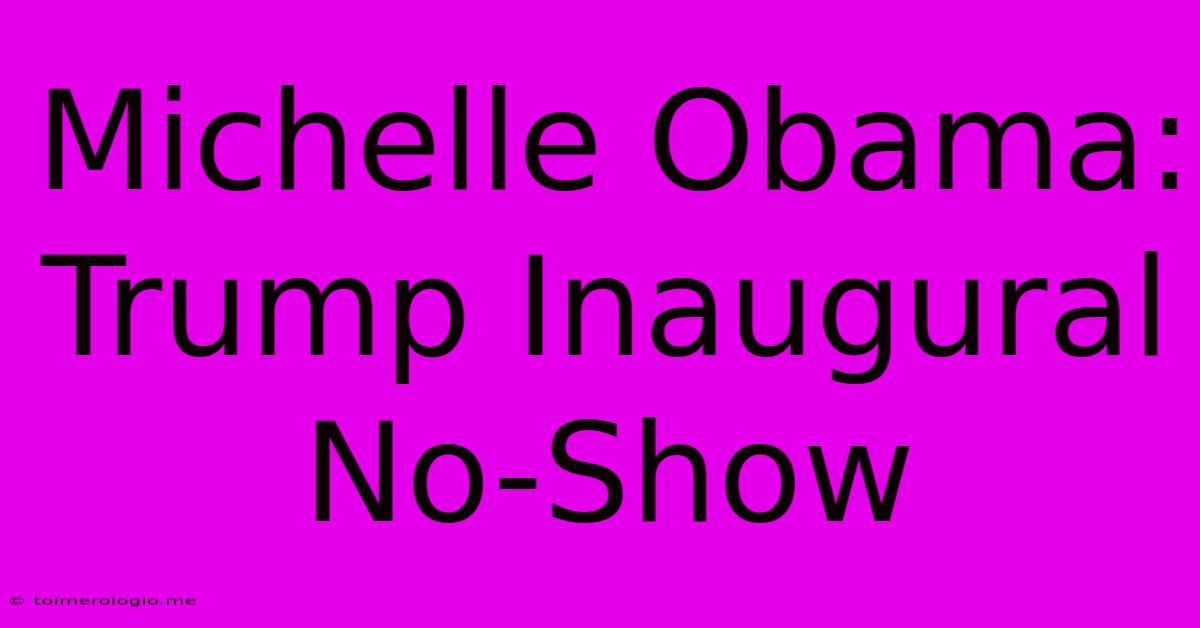Michelle Obama: Trump Inaugural No-Show

Discover more detailed and exciting information on our website. Click the link below to start your adventure: Visit Best Website toimerologio.me. Don't miss out!
Table of Contents
Michelle Obama: A Dignified Absence from Trump's Inauguration
Michelle Obama's absence from Donald Trump's 2017 presidential inauguration sparked considerable discussion and analysis. Her decision, though unspoken, resonated deeply, becoming a powerful symbol interpreted through various lenses – political, social, and personal. This article delves into the reasons behind her absence, exploring the context, the implications, and the lasting impact of this significant event.
The Weight of History and Protocol
Historically, outgoing First Ladies have traditionally attended the inauguration of their successors, symbolizing a peaceful transition of power and a display of national unity. However, the highly charged political climate surrounding the 2016 election, coupled with the unprecedented nature of Donald Trump's victory, created an unusual and complex situation. The deeply divisive campaign had left many feeling raw and uncertain about the future.
The Obamas, known for their grace and composure throughout their time in the White House, faced a particularly difficult choice. Attending the inauguration would have been seen by some as an endorsement of Trump's presidency and his policies, a tacit acceptance of the rhetoric and divisions he had fostered. Conversely, a no-show could be interpreted as a snub, an unprecedented break from tradition that would further inflame already strained political tensions.
Beyond Protocol: A Personal Decision
Ultimately, Michelle Obama's decision wasn't just about protocol; it was a deeply personal one, reflecting her own feelings and beliefs. While neither she nor former President Barack Obama publicly commented extensively on the reasons for their absence, their actions spoke volumes. The choice to remain in Washington D.C. while other former presidents attended the ceremony, signaled a deliberate, and arguably, a more meaningful gesture than simply attending the event out of a sense of obligation.
The Significance of Silence
The lack of an official statement regarding Michelle Obama's absence added another layer of complexity. The absence of a direct explanation allowed for diverse interpretations and fueled speculation. This silence, in itself, became a powerful communication strategy, avoiding any direct confrontation or fueling of political controversy, while simultaneously conveying a clear message through action.
Reading Between the Lines
Many analysts interpreted the absence as a subtle but potent protest against Trump's presidency. The previous years had been marked by highly divisive rhetoric, accusations of racism and sexism, and a general atmosphere of hostility. For many, Michelle Obama's absence represented a silent protest against this climate, a refusal to participate in an event that symbolized a presidency they fundamentally disagreed with.
The Broader Context: Social and Political Divides
The decision must also be understood within the context of the wider social and political divisions in the United States at the time. The election had exposed deep rifts in American society, and the inauguration served as a potent symbol of these divisions. Michelle Obama's absence became a reflection of these divisions, highlighting the deep-seated anxieties and uncertainties felt by many Americans.
Symbolism and Representation
Her absence became symbolic for many who felt marginalized or threatened by Trump's rhetoric and policies. It represented a refusal to normalize or legitimize a presidency that they viewed as fundamentally at odds with their values. For these individuals, her silent protest was a powerful act of solidarity.
The Lasting Legacy: A Powerful Statement
Michelle Obama's absence from the inauguration transcended a simple act of non-attendance. It became a powerful statement about political protest, the limits of civility, and the need for ethical leadership. Her decision resonated deeply with many people, both those who supported her decision and those who disagreed with it.
Beyond the Speculation: A Reflection of Values
The speculation and subsequent analyses surrounding the decision reveal more about the diverse perspectives and interpretations that exist within society. Ultimately, her decision is a testament to her unwavering commitment to her personal convictions and the silent power of meaningful action.
Conclusion: A Moment Frozen in Time
Michelle Obama's absence from Donald Trump's inauguration was not simply a matter of protocol; it became a defining moment in American political history. Her decision resonated far beyond the event itself, symbolizing the deep political and social divisions within the country, while simultaneously demonstrating the power of silent protest and the importance of personal convictions. The event remains a subject of discussion and analysis, showcasing the enduring significance of her actions and their lingering impact on the American political landscape. Her choice to prioritize her values over political convention cemented her image as a thoughtful, principled, and powerful figure in modern American history. The significance of her silent protest continues to resonate years later, shaping conversations around political action and representation.

Thank you for visiting our website wich cover about Michelle Obama: Trump Inaugural No-Show. We hope the information provided has been useful to you. Feel free to contact us if you have any questions or need further assistance. See you next time and dont miss to bookmark.
Also read the following articles
| Article Title | Date |
|---|---|
| Student Activities For Mlk Jr Day | Jan 25, 2025 |
| Los Angeles Mlk Day Commemoration Events | Jan 25, 2025 |
| Mlk Day In The Us New Warnings Issued | Jan 25, 2025 |
| Johnsons Coaching Move To Bears | Jan 25, 2025 |
| Official Ben Johnsons Coaching Destination | Jan 25, 2025 |
